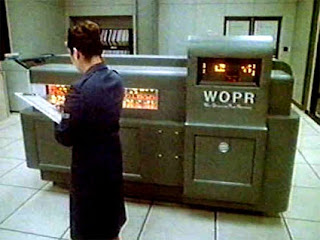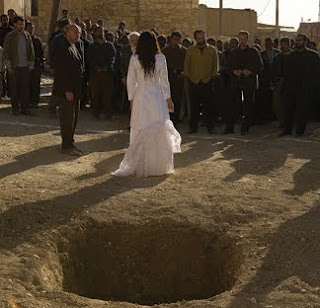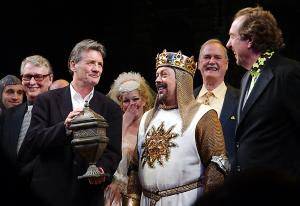For a funny movie that has the potential to tell a creative, profound moral lesson,
The Invention of Lying stinks up its message and presents a simplistic, insulting criticism of Christianity--really, of any revelatory religion.
The set up is pretty brilliant, and the first part of the movie is very funny. The setting is a world much like our own, excecpt that no one has ever told a lie. The real humor comes from the fact that not only does no one tell a lie, but everyone says exactly what's on his or her mind. When the main character Mark, played by Ricky Gervais, of
The Office fame (he also co-wrote the screenplay), takes Anna out on a date, they can't help but be honest with one another. The waiter, too: as he comes to take their order, he says, "I'm very embarassed to work here." Anna orders the salad, "because I think I'm fat but I also think I deserve something that tastes good." Mark, the fish tacos, "because I had them once and it's all I know." When Anna's mom calls during dinner, she openly discusses her date: "No, not very attractive. . . . Kind of funny. A bit fat. Funny little snub nose. No, I won't be sleeping with him tonight."

We get an example of advertising, a Coke commercial. "Hi, I'm Jim and I'm the spokesperson for the Coca-Cola company. I'm here today to ask you to continue buying Coke. . . . It's basically just brown sugar water, we haven't changed the ingredients lately, so there's nothing new about it I can say. We changed the can around a little bit. . . . It's Coke. It's very famous. I'm Jim, I work for Coke, and I'm asking you to not stop buying Coke." Later we see an ad on the side of a bus: "Pepsi. When they don't have Coke." And how about this for honesty in signage: the nursing home where Mark's mom lives is called "A Sad Place for Hopeless Old People."
Mark works for Lecture Films: "We film someone telling you about things that happened." That describes the whole of T.V. There is no fiction, no movies as we know them. Fiction, art, it's all lies. Creativity is nonexistent. Therein lies the first problem: the movie portrays all of life and culture as bland and uninteresting without the ability to lie.

Mark, desperate for money, lies to a teller about his bank account balance--the first lie ever told! Mark uses his new "power" to enrich himself, but he also uses it for good. He gives some of his new wealth away, but he also uses what we would call white lies to encourage people, to give his suicidal neighbor hope, to bring young lovers together, and, most importantly, to give his dying mother something to look forward to. She tells her son she's scared of dying, but Mark tells her he has a surprise for her, and goes on to describe what will happen after she dies. "You're going to be young again, and you'll be able to run through the fields and dance and jump, and there will be no sadness, no pain, just love and laughing and happiness. . . . Everyone will live in giant mansions. . . . and it will last for an eternity."
The hospital staff overhears all of this. Of course they've never heard anything like it and are filled with hope. Word quickly spreads of Mark's revelations and crowds surround him, wanting to hear more. He writes all night and emerges from his home, holding his revelations taped on two pizza boxes, looking like Moses holding the tablets of the Ten Commandments. Mark attributes all he's learned to a "man in the sky" who rewards us according to how good we are, and if we do bad things we go to the worst place imaginable.
Of course all his fame and notoriety take its toll on Mark, especially since he's still the only one capable of lying, and is forced to keep that secret to himself. The story from there isn't all that interesting. I was uncomfortable with the portrayal of lying as a means to self-aggrandizement and the generally positive effects on Mark's life and others; there was no sense of the consequences of lying.
I was more disturbed by the turn the movie took from a funny fantasy to a caustic mocking of Christianity. I try to put myself in the shoes of a secular person, or someone who has a vague understanding of the Bible, and can imagine them thinking, Yeah, that sounds like Christianity, and it must be all made up by some guy.
Clearly this is a movie with an agenda. They are not interested in provoking people to think; they are interested in knocking down people's beliefs. I am not opposed to inviting discussion, challenging faith, examining belief. But that's not what this movie does. It's an all-out attack on Christianity.
Bottom line, 1/2 star (for the funny parts)
![[we_feed_the_world_01.png]](https://blogger.googleusercontent.com/img/b/R29vZ2xl/AVvXsEhLAGjZdrd8mGB38WMh8LBgtG0N6yRDZqnO4MReOJ17ISHso34ZP9-jJmb9coXPfmK0Bs60JMBo-UJg8LT2H84KZawD9WohOgyF3VvrCnL090mpjhu6BhgT72Dw4_GCVf0T9_dg5kjScCeH/s320/we_feed_the_world_01.png)































